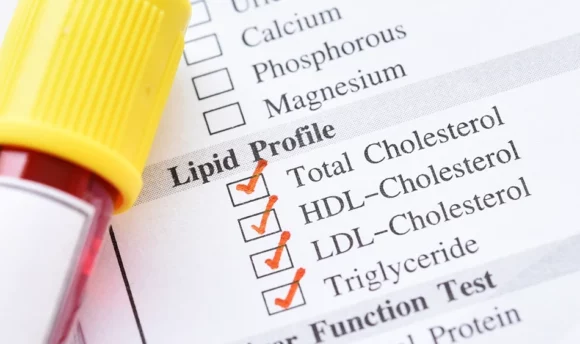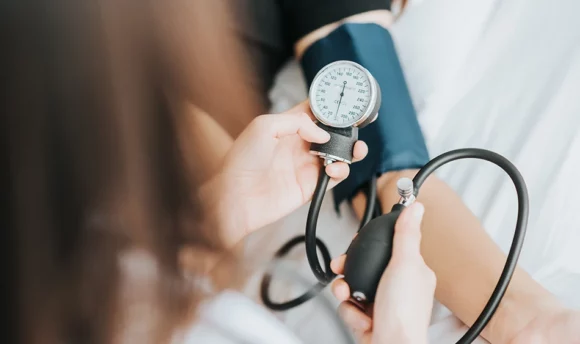Unlocking Heart Health: Your Guide to a Happier Heart
Worried about maintaining good heart health? Find out everything you need to know about keeping your cardiovascular system in tip-top shape.

Heart disease is the leading cause of death worldwide and in the United States. From obesity to smoking, there are a range of factors that increase your risk of developing heart problems. However, most of these factors all have one thing in common – they’re part of an unhealthy lifestyle.
Luckily, you can treat or prevent high blood pressure, high cholesterol levels, and heart disease with healthier lifestyle choices, but what are they, and how do you make them?
Whether you’re looking to completely overhaul your lifestyle or simply make a few tweaks, read on to discover everything that you need to know about improving your heart health today.
Understanding Heart Health
As your heart pumps, it pushes blood around the body to where it is needed, carrying oxygen, hormones, and other important compounds, while also helping to eliminate the waste products of metabolism. When the heart stops pumping, this means that these essential functions can’t be performed, leading to multiple organ failure and, eventually, death.
For example, heart failure can be caused by several unhealthy lifestyle factors, including lack of exercise, eating an unhealthy diet, and drinking excessively or smoking. All of these factors can lead to atherosclerosis, which is the process that occurs when your arteries become narrowed due to a build-up of fatty deposits inside of them.
These deposits are called plaque, and prevent blood from traveling through the arteries to where it is needed in the body, causing coronary artery disease (CAD). If the plaque breaks, this can trigger a heart attack, stroke, and generally poor heart health.
Although developing some form of cardiovascular disease is common as we age, it can be prevented by making healthy lifestyle choices, which we’ll explore in detail within this article.
These small changes can reduce the risk factors for heart disease, including high blood pressure and cholesterol levels, before they begin to cause lasting damage to your cardiovascular system.
How to Improve Heart Health: 7 Tips for a Stronger Heart
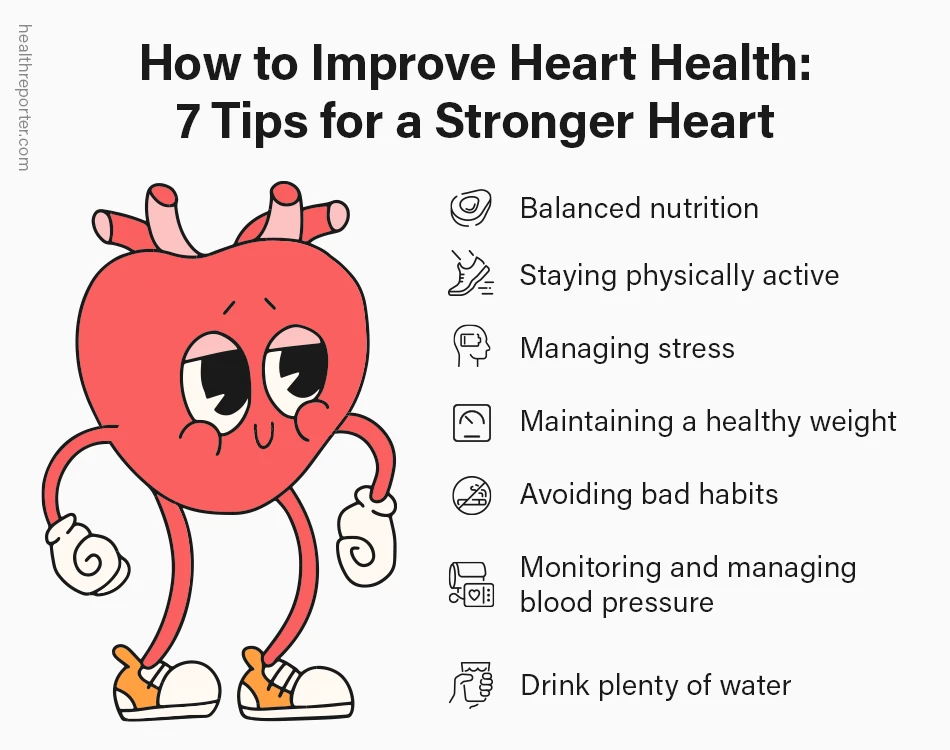
Choosing to live as healthy as possible has hugely positive effects on your heart health by helping to lower high blood pressure, reducing your risk of cardiovascular disease, and preventing related conditions such as cancer and type 2 diabetes.
Here are 7 things that you can start doing today to take control of your heart health and increase your quality of life:
#1 Balanced nutrition
To keep your heart healthy, the Institute of Medicine of the National Academies recommends getting 45–65% of your calories from carbs, 20–35% from fats, and 10–35% from protein, depending on your preferences and lifestyle.
Try to limit the amount of saturated and trans fats in your diet, which are generally found in processed foods and animal fats. Consuming them too frequently increases levels of “bad” LDL cholesterol and puts you at a greater risk of coronary heart disease, heart attack, and stroke.
Instead, eat plenty of lean protein sources (chicken, tofu, or legumes, for example), whole grains, fruits and vegetables, and healthy unsaturated fats (olive oil is a great choice).
#2 Staying physically active
Leading a sedentary lifestyle has several adverse impacts on the human body, including increasing your risk of developing:
- Metabolic disorders such as diabetes and hypertension (high blood pressure)
- Chronic inflammation
- Obesity
- Cancer
- Heart disease
- Musculoskeletal disorders such as osteoporosis
- Depression
Along with eating well, it’s therefore important to incorporate some form of regular exercise into your week to keep your heart, body, and mind healthy. A combination of both aerobic exercise and resistance training is most effective in burning calories while helping you to build lean muscle mass, and has been shown to increase longevity.
The American Heart Association recommends performing at least 150 minutes of moderate-intensity exercise per week, which could include brisk walking, cycling, playing tennis, or even vacuuming. Alternatively, fit in 75 minutes of more vigorous aerobic activity like running or hiking, or a combination of both.
#3 Managing stress
When you’re stressed, your blood pressure and heart rate quickly become elevated due to high levels of cortisol, the stress hormone. Over time, chronic stress therefore increases your risk of heart disease.
To prevent this from happening and lower your heart rate, try to manage your stress levels by prioritizing self-care. Along with eating well and exercising regularly, get plenty of sleep, eliminate self-destructive behavior, start practicing meditation, and try journaling.
#4 Maintaining a healthy weight
Eating a diet that is balanced with carbohydrates, proteins, and fats, along with vitamins and minerals is essential for helping you to maintain a healthy weight.
You’ll feel full, satisfied, and will be less likely to overeat, which means you’ll naturally consume fewer calories.
Carrying excess weight also causes fatty materials to clog your arteries, which increases your risk of a heart attack.
#5 Avoiding bad habits
Consuming an excessive amount of alcohol has been shown to cause stroke, high blood pressure and heart rate, and even heart failure. It also puts strain on the heart, causing a disorder called alcoholic cardiomyopathy that prevents the heart muscle from pumping blood effectively.
Smoking is another bad habit that increases your risk of cardiovascular disease (CVD), with tobacco causing 1 in every 4 CVD deaths. This also affects those around you even if they don’t smoke, with exposure to second-hand smoke leading to heart attacks and strokes. It’s therefore important to quit this habit immediately to improve your heart health.
#6 Monitoring and managing blood pressure
It’s not always necessary to visit the doctor’s office to measure your blood pressure, as you can easily do this from the comfort of your own home using a self-measured blood pressure monitor. This can be placed on your upper arm, which provides you with an accurate reading.
You could also use a blood pressure app, which is a simple and convenient way of monitoring your levels on the go.
Normal blood pressure is considered to be below 120/90mmHg. If your readings are consistently low or high, you should consult a doctor, who may prescribe medications and recommend some of the lifestyle changes we’ve mentioned.
#7 Drink plenty of water
With our bodies made up of approximately 60% water, staying hydrated is essential for good heart health. Being hydrated ensures that your heart can effectively pump blood to where it is needed in the body without too much strain, reducing your risk of heart failure.
Heart Health and Sodium
Salt contains just two elements, which are sodium and chloride. Excessive sodium consumption can contribute to high blood pressure, which increases your risk for heart disease.
It’s therefore recommended for healthy adults to eat no more than 2.3 grams of sodium per day, which is roughly equivalent to a teaspoon of salt. When at the grocery store, look for foods with a 5% or less Daily Value (DV) or less for sodium, and avoid those with a DV of 20% or higher.
Ready meals, canned, and processed foods tend to contain higher sodium levels, so try to eat fresh foods and make your own meals to control your salt intake where possible.
You should also choose reduced-salt condiments, including soy sauce, ketchup, and stock cubes to lower your blood pressure quickly, reducing your risk of heart attack and stroke.
Low-Sodium Food List
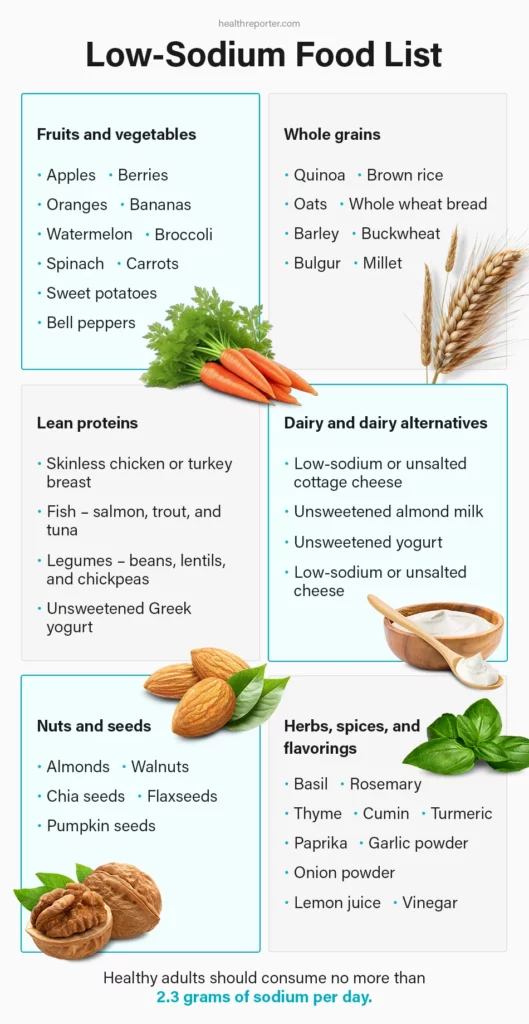
To help reduce your sodium consumption, there are a wide variety of low-salt foods that should be a huge part of any heart-healthy diet. Try adding these fresh, whole foods to your plate on a daily basis, and minimize your consumption of salty processed and convenience foods.
Fruits and vegetables
Along with being low in sodium, fruits, and vegetables contain large amounts of fiber, a carbohydrate that is essential for good heart health. Eating dietary fiber also keeps you fuller for longer, meaning you’re less likely to overeat and put weight on.
These foods are low in calories, so adding more of them to your meals or snacks can naturally reduce the number of calories you consume, lowering your risk of developing obesity and other cardiovascular health issues.
Canned vegetables are generally high in sodium, so drain and rinse these convenience foods before eating them. You should also try adding some of the following heart-healthy fruits and vegetables into your diet:
- Apples
- Berries
- Oranges
- Bananas
- Watermelon
- Broccoli
- Spinach
- Carrots
- Sweet potatoes
- Bell peppers
Whole grains
Whole grains are another great source of fiber, and dietary guidelines suggest that they make up at least half of all the grains that you eat. They also contain vitamins, minerals, and antioxidant, including potassium, which helps to maintain good blood pressure and has been shown to reduce the risk of stroke.
Substitute refined grains such as white bread and low-fiber, sugary cereals for these options instead, and avoid adding extra salt when preparing them:
- Quinoa
- Brown rice
- Oats
- Whole wheat bread
- Barley
- Buckwheat
- Bulgur
- Millet
Lean proteins
Including fresh, lean meats in a healthy diet is a great way of boosting your protein intake without consuming too much unhealthy saturated fat or sodium, which is typically added to processed meats. Fish is also a great option, as many types contain omega-3 fatty acids, which lower blood fats called triglycerides and therefore support a healthy heart.
For those on a plant-based diet, legumes are an ideal meat substitute as they’re protein-rich and low in cholesterol. Here are some of the best lean proteins to include in your meals:
- Skinless chicken or turkey breast
- Fish – salmon, trout, and tuna
- Legumes – beans, lentils, and chickpeas
- Tofu
- Unsweetened Greek yogurt
Dairy and dairy alternatives
In the past, it’s often been thought that eating high-fat dairy products negatively impacts heart health. However, recent studies have found that they may actually reduce your risk of heart and circulatory diseases, particularly those that contain healthy unsaturated fats and good amounts of protein.
Some dairy products contain added salt or sugar to boost the flavor, which can cause high blood pressure and increase your chances of having a heart attack. It’s therefore important to select the following options:
- Low-sodium or unsalted cottage cheese
- Unsweetened almond milk
- Unsweetened yogurt
- Low-sodium or unsalted cheese
Nuts and seeds
Nuts and seeds are great sources of healthy unsaturated fats, and eating them as an alternative to snacks containing saturated fats reduces the levels of bad cholesterol and triglycerides in the blood. Choose raw or roasted nuts and seeds rather than those with added flavorings or salt, including:
- Almonds
- Walnuts
- Chia seeds
- Flaxseeds
- Pumpkin seeds
Herbs, spices, and flavorings
Herbs, spices, and flavorings are good for seasoning your meals without adding extra salt. They also intensify the flavor, adding a unique yet tasty flavor to your favorite dishes. Furthermore, spices such as turmeric have powerful anti-inflammatory properties, which may reduce your risk of health conditions such as heart disease.
Here are some of our favorite flavorings to spice up your usual meals:
- Basil
- Rosemary
- Thyme
- Cumin
- Turmeric
- Paprika
- Garlic powder
- Onion powder
- Lemon juice
- Vinegar
Maintaining Optimal Blood Pressure and Cholesterol Levels
Having large amounts of bad LDL cholesterol in your body and high blood pressure are two common causes of heart disease or stroke. They can be triggered by several different factors, yet also easily prevented by making good choices every day.
For example, smoking poses several dangers to your heart health, cholesterol, and blood pressure levels, including:
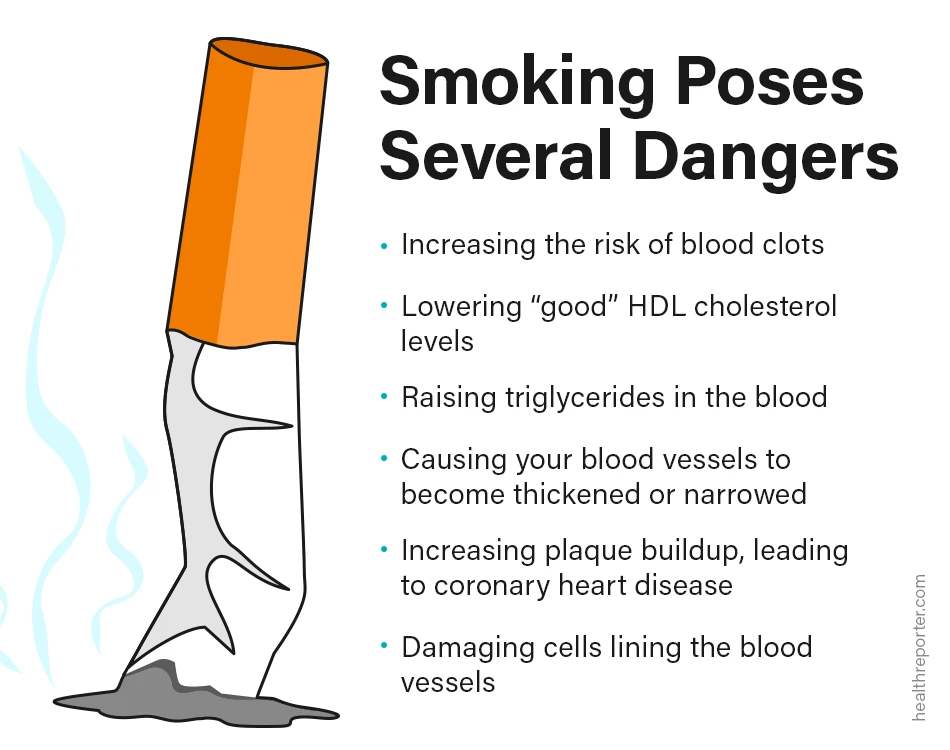
- Increasing the risk of blood clots
- Lowering “good” HDL cholesterol levels
- Raising triglycerides in the blood
- Causing your blood vessels to become thickened or narrowed
- Increasing plaque buildup, leading to coronary heart disease
- Damaging cells lining the blood vessels
Not only can it harm your health, but exposing others to secondhand smoke also increases their risk for stroke or heart disease even if they don’t smoke themselves. So, although it can be challenging, it’s essential to take steps toward quitting smoking as soon as possible.
To keep your cravings at bay in the short term, try chewing on gum, hard candy, or something crunchy like raw carrots. In the long term, nicotine replacement therapies such as nasal sprays, nicotine patches, or prescription drugs can help to overcome your cravings.
Similarly, recent research suggests that any amount of alcohol consumption can increase your risk of cancer and cardiovascular diseases by boosting your blood pressure, and no safe limit can therefore be established to protect your heart health.
Although it is advised against, if you do choose to drink alcohol, it’s recommended for men to consume 2 drinks or less, and 1 drink or less for women per day.
Another way of maintaining optimal levels is by getting 7 hours or more of sleep per night, as those who don’t achieve this target are more likely to encounter health problems like stroke, heart attack, and heart disease. This is because sleeping helps to keep your blood pressure down.
If you’re struggling with insomnia, it’s important to lower your stress levels, particularly if you get anxiety at night. Try taking a warm bath, not using your phone, and reading before bed, which can put you in the right mindset for sleep.
Screening and Early Detection
Heart disease is most treatable in its early stages, which is why regular preventative screenings with your healthcare provider are so effective and essential. For instance, plaque build-up is one of the first indications of the disease as it causes blockages in the arteries, restricting blood flow, causing chest pain, and preventing oxygen from reaching the heart.
The first screening physicians typically use are blood tests, which help to get your blood sugar, cholesterol, and blood pressure checked. If any of these levels are unusual, they may recommend further screenings, including:
- Electrocardiograph – Monitors heart rate and rhythm using electrical activity.
- Echocardiography – Uses ultrasound to monitor the heart’s movement.
- Cardiac stress test – Walking on a treadmill or using a stationary bike, physicians will track your blood flow through various levels of intensity.
Although most common in older adult men, there are several other factors that increase your heart disease risk.
If you have a high body mass index, low levels of physical activity, unhealthy dietary habits, or smoke and drink regularly, it’s important to get regular screenings. You should also seek professional advice on how to reduce your risk with some small lifestyle changes.
Even if you don’t have symptoms or risk factors, the American Heart Association recommends getting cardiovascular screenings from the age of 20 as a preventative measure. The results will not only protect your health but can also motivate you to start or continue leading a healthier lifestyle.
FAQs
Some early warning signs of heart failure include fatigue and weakness, rapid or irregular heartbeat, wheezing, a cough that doesn’t go away, stomach or ankle swelling, shortness of breath, and reduced ability to exercise.
Eggs are a naturally high-cholesterol food, and some studies have shown that eating them excessively may increase your risk of heart disease. However, it’s generally thought that eggs don’t raise cholesterol levels in the same way as foods high in saturated fats. You should aim to eat less than 300 milligrams of cholesterol per day. Keep in mind that there is around 186 mg of cholesterol in one large egg.
You should eat no more than 2.3 grams of salt per day, and ideally, most adults should try to move towards a limit of less than 1.5 g.
A Word From Our MD
Maintaining a healthy heart is essential, as it is responsible for transporting oxygen and nutrient-rich blood to where it is needed in the body, while also removing any waste and toxins.
Those who fail to look after their cardiovascular systems are at a much higher risk of atherosclerosis, where fatty deposits build up in the arteries. This increases your chances of stroke, coronary artery disease, heart attack, and heart failure.
There are some risk factors that you can’t control, such as age, gender, and genes. However, there are several lifestyle changes you can make that can protect your heart health in the long term. Try to eat a balanced and healthy diet with plenty of fiber, whole grains, fruits, and vegetables, while lowering your saturated fat, salt, and sugar intake.
You should also quit smoking, reduce your alcohol consumption, exercise regularly, and get regular preventative screenings. If you are worried about your heart health, then you consult a healthcare professional as soon as possible.
Conclusion
As we age, our risk of poor heart health naturally increases. However, there are plenty of small, yet effective steps that you can take today to lower blood pressure and cholesterol levels, from eating less salt, to adding more stress-busting self-care activities into your weekly routine.

















































 Select your language:
Select your language: 







